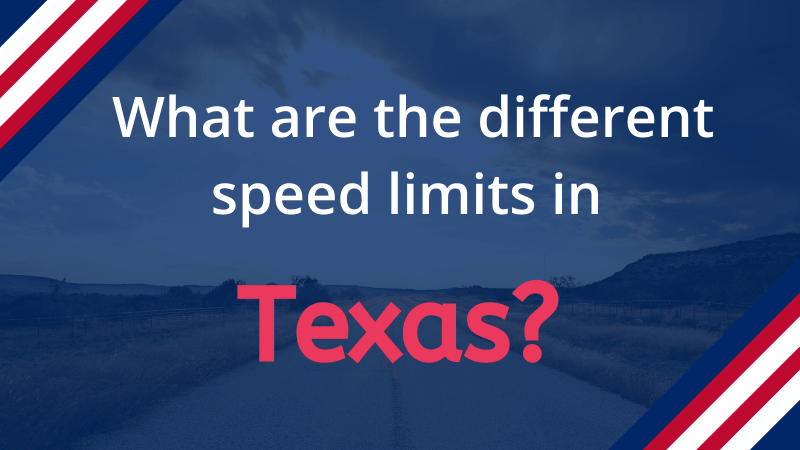Speed limits are probably the last thing that comes to mind when traveling to an interesting place such as the U.S. state of Texas. But, the state’s traffic authority sets out clear guidelines that must be followed to avoid getting a traffic ticket, points on your license, or, worse, jail time.
Yes, there is much to take in on a trip to Texas or if you have just moved there, but one of the things that you absolutely need to be aware of is the speed limits in Texas – the various speeds you can travel on different roads in Texas.

Texas, like many other states, requires that Texas speed limits on state roadways are to be set at the maximum limit unless traffic and engineering studies indicate that the speed limit has to be changed due to safety reasons. The speed limits in Texas are set by the Texas Department of Transportation.
Where the Texas speed limit gets a little complex when compared with other states is the maximum speed limit variations. The law in Texas sets the maximum speed limit at 70 mph, however, it allows the Texas Transportation Commission to establish a maximum speed limit of 75 mph and even 80 mph and 85 mph if the highway is designed to accommodate that speed and is deemed safe after being reviewed.
Something that makes Texas so unique from a driving perspective is that you can reach a maximum speed limit of 85 mph within the state, which is impossible to do anywhere else in the United States. However, this maximum speed limit only exists on one specific highway, Texas Highway 130. The highway is situated on a stretch of farmland over on the southeastern side of Austin, TX, the highway spans across 41 miles of road and ends in Seguin, and is a toll road, so it will set you back around $9.
So, you must keep in mind that, for the most part, the maximum speed limit is 70 mph on most highways, although depending on where you are, this could change and be as fast as 85 mph. Always keep an eye on the road signs as you do not want to be caught and slapped with a hefty speeding fine!
What are the Speed Limit Laws in Texas to be aware of?
It is essential to familiarize yourself with the speed limit laws in Texas for specific areas and regions within the state.
Speed limit laws in Texas by type of road and zone
- 15 mph in an alley, on a beach, or on a county road adjacent to a public beach is the max limit.
- 15 mph in school zones.
- 30 mph is the maximum speed limit in an urban district on a street rather than an alley.
- 60 mph is the max speed limit if the vehicle is a school bus on a numbered state or federal highway outside an urban district.
- 60 mph in the daytime and 55 mph at nighttime if the vehicle is a truck or truck-tractor towing a semi-trailer on a farm-to-market or ranch-to-market road.
- 70 mph in the day and 65 mph at night if the vehicle is a passenger car, motorcycle, light truck towing a trailer or semitrailer, truck or truck-tractor, truck or truck-tractor towing a semitrailer or buses on a numbered state or federal highway outside an urban district, including a farm-to-market or ranch-to-market road.
As you can see, the maximum speed limit you can generally drive in Texas is 70 mph and 85 mph on some specific highways. Considering that Texas has several interstate highways connecting various parts of the state, you will probably spend a lot of time on such roads if you are commuting or driving through the state.
Penalties for breaching Texas speed limit laws
Speeding tickets and accumulative points are a natural occurrence when you go over the designated speed limits in Texas and get caught! Your job as a safe driver is to abide by the speed limit to not only avoid fines and point penalties but to potentially save lives and prevent unnecessary accidents.
Depending on the location of the speeding offense, if you receive a speeding ticket in Texas, you will likely pay.
Summary of Texas Speed Limit Fines
- $246 in fines and court costs for speeding.
- $304 for speeding in a school zone.
- $356 for speeding in a construction zone with workers present.
Your fines and court costs might differ depending on the location you are in when you commit the offense, however, usually this will be a one-time payment with no additional charges.
Be aware that your auto insurance rates will continue to rise for up to three years while you still have points on your record.
The points system in Texas is pretty straightforward, moving violations are 2 points on your license, and moving violations that result in an accident are 3 points. You will receive an additional fine if you accumulate 6 or more points within a three-year period.
The amount a driver will have to pay increases with the number of points on their record. A driver who manages to receive 4 moving violations in a 12-month period, or alternatively 7 violations within a 24-month period will have their license suspended.
It is clear that road safety is of great importance to the people of Texas. You can play your part by knowing and observing the specified maximum Texas speed limit and various other speed limits.


